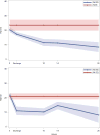Two Behavioral Interventions for Patients with Major Depression and Severe COPD
- PMID: 27591157
- PMCID: PMC5069195
- DOI: 10.1016/j.jagp.2016.07.014
Two Behavioral Interventions for Patients with Major Depression and Severe COPD
Abstract
Objective: Personalized Intervention for Depressed Patients with COPD (PID-C), a treatment mobilizing patients to participate in their care, was found more effective than usual care. To further improve its efficacy, we developed a Problem Solving-Adherence (PSA) intervention integrating problem solving into adherence enhancement procedures. We tested the hypothesis that PSA is more effective than PID-C in reducing depressive symptoms. Exploratory analyses sought to identify patients with distinct depressive symptom trajectories and compare their clinical profiles.
Design: Randomized controlled trial.
Setting: Acute inpatient rehabilitation and community.
Participants: A total of 101 diagnosed with chronic obstructive pulmonary disease (COPD) and major depression after screening 633 consecutive admissions for acute inpatient rehabilitation.
Intervention: Fourteen sessions of PID-C versus PSA over 26 weeks.
Measurements: 24-item Hamilton Depression Rating Scale.
Results: PSA was not more efficacious than PID-C in reducing depressive symptoms. Exploratory latent class growth modeling identified two distinct depressive symptoms trajectories. Unlike patients with unfavorable course (28%) who remained symptomatic, patients with favorable course (72%) had a decline of symptoms during the hospitalization followed by a milder decline after discharge. Patients with unfavorable course were younger and had greater scores in disability, anxiety, neuroticism, and dyspnea related limitation in activities and lower self-efficacy scores.
Conclusions: Both interventions led to sustained improvement depressive symptoms. PID-C matches the skills of clinicians employed by community rehabilitation programs and can be integrated in the care of depressed COPD patients. Patients with severe disability, anxiety, neuroticism, and low self-efficacy are at risk for poor outcomes and in need of close follow-up and targeted interventions. .
Keywords: COPD; clinical trial; disability; dyspnea; geriatric depression; personalized intervention.
Copyright © 2016 American Association for Geriatric Psychiatry. Published by Elsevier Inc. All rights reserved.
Conflict of interest statement
Dr. Alexopoulos serves at the speakers’ bureaus of Takeda, Lundbeck, Otsuka, and Sunovion. No other authors report conflicts of interest.
Figures



Comment in
-
Behavioral Interventions for Patients with Major Depression and Severe COPD.Am J Geriatr Psychiatry. 2016 Nov;24(11):975-976. doi: 10.1016/j.jagp.2016.08.012. Epub 2016 Aug 26. Am J Geriatr Psychiatry. 2016. PMID: 27660195 No abstract available.
References
-
- Raherison C, Girodet P-O. Epidemiology of COPD. European Respiratory Review. 2009;18:213–221. - PubMed
-
- NHLBI. Morbidity, Mortality: 2004 Chart Book on Cardiovascular, Lung, and Blood Diseases. 2004 May; NIH Webpage.
-
- Alexopoulos GS, Latoussakis V. Depression comorbidity with COPD. Psychiatr Ann. 2004;34:289–295.
-
- Jennings JH, Digiovine B, Obeid D, et al. The association between depressive symptoms and acute exacerbations of COPD. Lung. 2009;187:128–135. - PubMed
-
- de Voogd JN, Wempe JB, Koeter GH, et al. Depressive symptoms as predictors of mortality in patients with COPD. Chest. 2009;135:619–625. - PubMed
Publication types
MeSH terms
Grants and funding
LinkOut - more resources
Full Text Sources
Other Literature Sources
Medical
Research Materials
Miscellaneous

